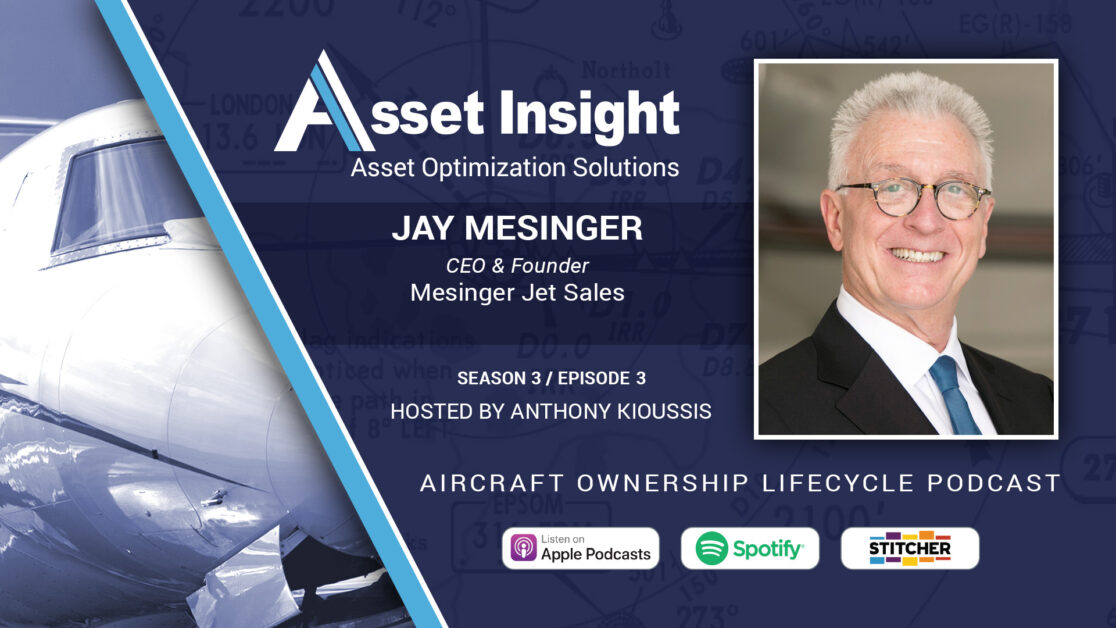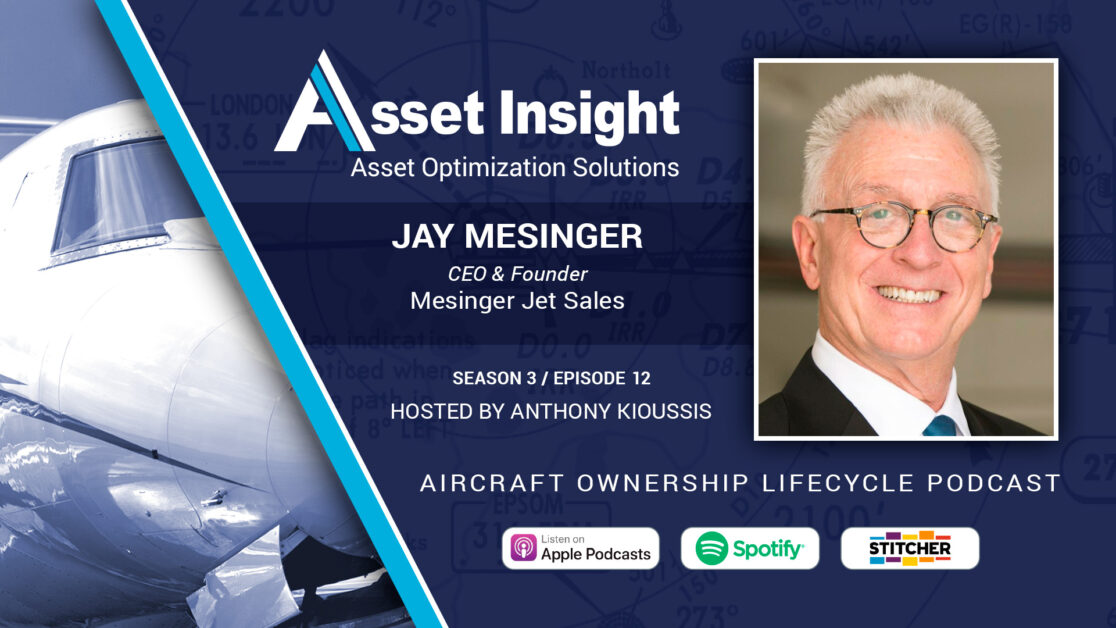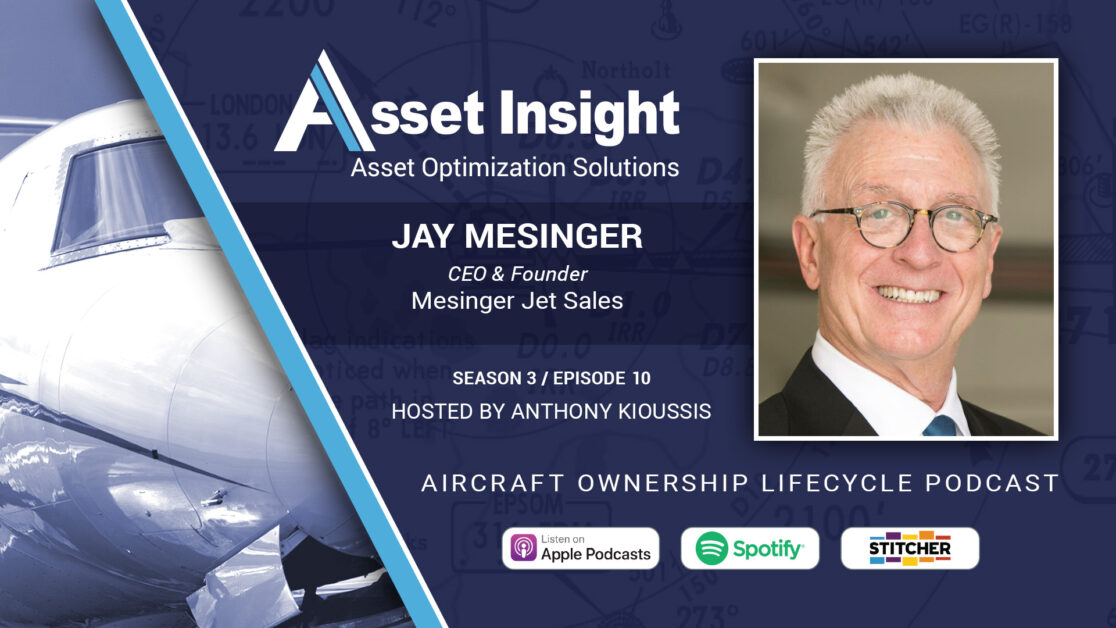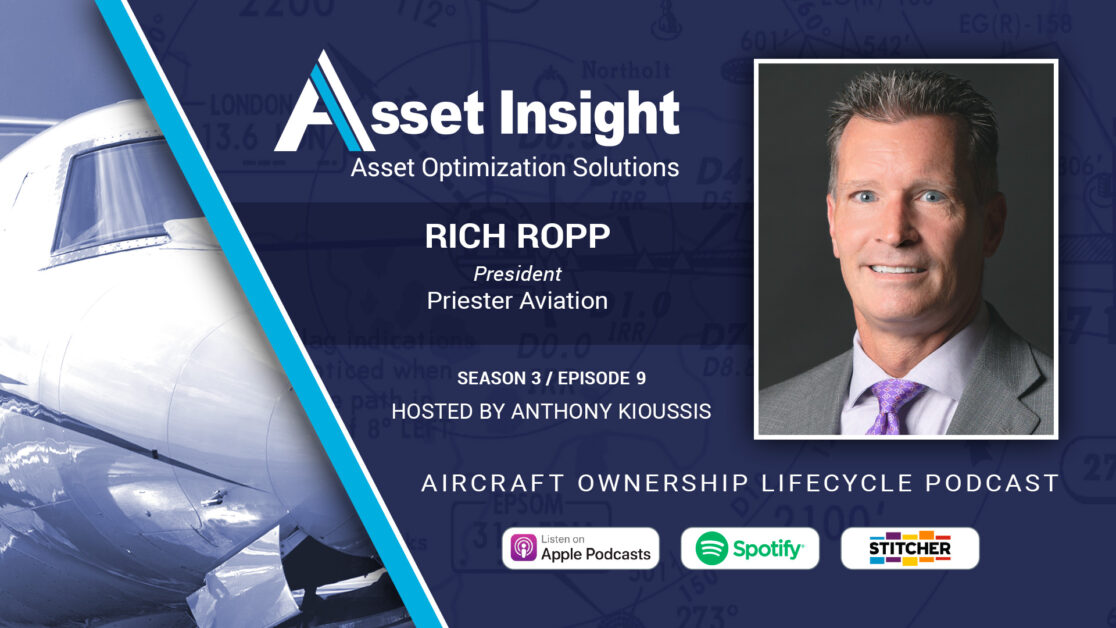
SEASON 3 • EPISODE 3
Low Inventory, High Demand, and Changes to the Sale and Purchase Process
By all accounts, 2021 was a very active year with respect to aircraft sales. With January 2022 posting an all-time low level of pre-owned inventory, combined with continuing high demand, we asked Jay Mesinger, CEO of Mesinger Jet Sales, to provide his view of the current market. Topics covered include:
- The purchase and sale process, and how it has changed.
- Characteristics surrounding the large number of first-time buyers during 2021.
- The effect Bonus Depreciation had on 2021 aircraft acquisitions.
- What is likely to happen to demand during the first half of 2022.
- Factors that continue to drive sales of aging aircraft.
About Jay Mesinger
Jay Mesinger is the CEO and Founder of Mesinger Jet Sales, an international aircraft brokerage firm, with over 48 years of experience in the aviation industry. Mesinger Jet Sales has modernized the formula for buying and selling aircraft providing their clients with the best market intelligence for aircraft sales pricing and correct acquisition expectations leading to successful transactions.
Jay is an industry leader and figurehead. He was a Member of the Board of the National Business Aviation Association (NBAA), and the Chairman of the Associate Member Advisory Council (AMAC). He was the first aircraft broker to serve on the NBAA board and served on the AMAC committee for 10 years ending in October, 2013. Jay has also been on the Customer Advisory Boards of Jet Aviation, Airbus North America and Duncan Aviation. Jay is and has been a member of Gulfstream’s “Key Player” team and Bombardier’s “Influencer” group since their respective inceptions. Jay is also a member of the European Business Aviation Association (EBAA) and the Colorado Aviation Business Association (CABA). And, Jay serves on the Board of Directors of The Morris Animal Foundation.
In addition, Jay regularly speaks at industry gatherings, writes the monthly Mesinger Pulse newsletter, and started the very first aviation brokerage website over 25 years ago.
Mesinger Jet Sales
Mesinger Jet Sales has modernized the formula for buying and selling aircraft providing our clients with the best market intelligence for aircraft sales pricing and correct acquisition expectations leading to successful transactions. Transparency, a hands-on process, forward-thinking intelligence and analysis, technical support throughout the transaction and an unwavering commitment to protecting our clients’ best interests are just some of the things that set us apart and all part of what leads to our success for our clients.
Tony Kioussis (00:33):
Welcome to another Asset Insight Podcast, covering the aircraft ownership life cycle. I am Tony Kioussis, president of Asset Insight, and your host. By all accounts, 2021 was a very active year with respect to aircraft sales with January 2022 posting an all-time low level of pre-owned inventory combined with continuing high demand, we thought it time to once again, have a conversation with Jay Mesinger, CEO of Mesinger Jet Sales, to gain his view of the current market. Always a pleasure to speak with you, Jay.
Jay Mesinger (01:08):
I’ll tell you, Tony, I always look forward to doing this podcast with you. It helps me think, it gets me ready, it gives me good fodder for my client conversations, so thanks.
Tony Kioussis (01:19):
Let’s get started. How did 2021 shake out, in your view? Any surprises?
Jay Mesinger (01:24):
Well, when you don’t have anything to sell, not selling anything shouldn’t be a surprise.
Tony Kioussis (01:29):
I never would’ve expected that one, but okay.
Jay Mesinger (01:32):
We had a fine year. To be honest with you, it was not as good as it could have been in all seriousness. I ended the year with 12 acquisition agreements, which we carried into the new year, but I could have accomplished them last year. I mean, I had the ability and the personnel, we just didn’t have the inventory.
Tony Kioussis (01:50):
The inventory has really been a problem. The numbers are just plum scary, they’re so low.
Jay Mesinger (01:55):
Yeah, I’ll tell you, Tony, it’s so interesting. It is a phenomenon that I have not seen before, literally, where there is nothing. There’s no way that we at Mesinger Jet Sales are going to fold up our tent or take our shingle down, but finding inventory, and where you’re finding inventory and what you’re paying for and the lengths that you would go today that I wouldn’t have even considered three months ago, I can’t tell you in the number of airplanes now that are being contemplated to come back in from Asia and China, the Middle East, and areas of the world that I don’t even know how to pronounce, and I don’t think I’d go there for a vacation, and we’re talking to them about bringing their airplanes in and buying them.
Tony Kioussis (02:38):
Yeah. We’re seeing some of that on the evaluation side and some of these airplanes are coming from places I’d never heard of as well. Let’s talk about the purchase and sale process.
Jay Mesinger (02:50):
I tell you, I tell Josh and Adam and Sandra all the time, I think I’m getting too old for this. It is not what we used to go through because process on both sides have changed. I thought about running an ad that said, “Hire Mesinger Jet Sales and let us manage your greed,” because as a seller, you are overwhelmed with the value of your airplane today compared to any other time, even from when you bought it. An airplane comes on the market. By noon, there are 10 offers, everyone on this full price. The seller goes, “Well, how am I going to break this tie?” Of course, it’s a horse race. Those airplanes that run the market four and 500 days are gone now. They say there’s two or 3% of manufactured fleet for sale, but when you really look at that two or 3% and see what it’s made up of, you really don’t have anything.
Jay Mesinger (03:39):
Today, if you hired me to buy a Challenger 604 or a Challenger 300 or a Gulfstream 650, there’d be nothing out there to buy, so we get on the phone, we call owners. We had an owner tell Adam the other day, “You’re my 10th call today, and I get that many every day,” and Adam called me. He goes, “What do I do?” I said, “You be the call he remembers he got, so that if they do put their airplane on the market, he thinks back, ‘Now, who do I want to call back first?'” That’s not how it used to be. You go to many of the catalog magazines today and the ads all say wanted. You look at the e-blasts that come in. They’re not new to the market, they’re wanted, so the days of having choice are gone. The days of understanding what to pay based on good, solid kinds of background work that the likes of your company do for owners are gone. Not that your value is gone, or my value is gone, but it’s different.
Jay Mesinger (04:37):
Today, if a plane sells, it sells for more than the one that day sold. Period. I think planes are going up 10% a month for the last three or four months. How sustainable is that? How comfortable and confident could you be as a buyer? When are we going to start sending people to sit on the fence and wait it out and say, “It’s just too much”? I’m not hearing a lot of that now, but I don’t know why. This is the for in my 48 years, given this kind of increase in value or cost of the airplane that I’m not hearing people say, “This is just the wrong time to buy.”
Jay Mesinger (05:11):
There has been so much wealth. You and I have talked about this in the last several podcasts, so much wealth created during the pandemic, and such a visceral disdain for going on the airlines, or going into a public airport, that people are taking that wealth and transferring it, in many cases, to aircraft ownership. I was on a webcast this morning and invited Jamie Walker, CEO and president of Jet Linx to be on it with me, and we were talking about the enormous amount of demand they’re having among their jet card users, among their charter, among their managed fleet. It’s just amazing. Then I had Todd Duncan on the call and I said, “Todd, airplanes are now flying four, five, 600 hours a year, not 250 or 300. How are you keeping up with the compressed maintenance schedule because the hourly events and cycle events are coming up sooner?” It’s difficult. Buying a plane is frustrating.
Jay Mesinger (06:05):
I wrote an article, came out today, and it was about winners and losers and I changed the name of the person that bought the plane to a winner and the nine people that missed it losers and I went on to say, “How long are we going to be able to keep the losers motivated to stay in this and be a part of a process that is so random?” The other thing that it’s doing is it’s bringing in a lot of people that have no business being in the middle of a transaction. But these are hungry times for many people that do what we do.
Jay Mesinger (06:34):
I kidded a little while ago about not having anything to sell, but there are some people that don’t have anything to sell, don’t have the credibility to go into the marketplace and raise their flag and have a seller see you first, so they just inject themselves into a deal where they don’t belong or have any real ownership of a listing agreement with an airplane or own the airplane, and just try to get in the middle, creating another bad process, which is a back-to-back transaction to just mask what’s going on. I’m watching some brokers put their own money down as deposits on airplanes, hopeful that they’ll find a buyer before they have to exercise any other money in the process to try to get in the middle of something. It’s very strange. That’s buying.
Jay Mesinger (07:16):
Selling, we’ve got, had a listing the other day on an airplane. We all looked at each other and said, “Okay, how do we do this?” We haven’t had a listing in a while. We’ve always just been buying of late. We decided we would not tell anybody about the airplane as opposed to picking up the phone and maybe calling half dozen people that we would maybe normally call first based on the category of plane. We kept completely silent. We finished 100% of the marketing package. We verified the specs, verified the process, had the seller’s attorney write an LOI that would be acceptable to them, and by the way, we included the ability for the buyer to do a pre-buy, which mini sellers are omitting now.
Jay Mesinger (07:58):
We sent out a complete marketing package, including the LOI that we would accept. We said, “We’ll keep this open for one week. At the end of the week, we’ll see what offers we have. We are not going to necessarily deal with them in the order with which they came in,” which was the process that we always did before. We’re going to look and see, which was the best offer? The best offer was a combination of price of adherence to the LOI that we sent, or how close you would be willing to use the LOI that we sent, and the credibility and certainty of the buyer. On the first day, Tony, the first e-blast we ran, we got 65 phone calls. Before the week was out, we had had 85 phone calls, and four offers.
Tony Kioussis (08:40):
Unbelievable.
Jay Mesinger (08:41):
We went and chose that buyer that checked those boxes. We believe we had a fair process. We said, “Don’t be crazy. Don’t think you’ve got to throw us an offer in the first five minutes that you’ve seen this first e-blast. Come see the airplane.” We grounded the airplane for the week. We had all the records there. We said, “Come see it before you make your offer. You don’t need to make your offer till next Wednesday. Come see it first. Come look at it. Come understand it. Come know it.” That also added to the credibility of the certainty of what we’d finally end up with, so that’s what our process du jour is.
Tony Kioussis (09:15):
Very different times, for sure, and on the selling, especially, very different. On the buying side, I was talking to a broker last week, and they were telling me how on one aircraft they had north of 20 offers. For those of us that have been in this business for a while, that sounds like lunacy, but that’s where we, aren’t we? We just got to deal with it the way it is, but like you, I’ve never seen anything quite like it.
Jay Mesinger (09:40):
The crazier that it gets with respect to people being willing to, as buyers, pass on the due diligence that I know is critical, or should be, like pre-buys, and the more that they’re willing to offer over ask to get the plane bought, the less sustainable it feels to me when it’s that frenzied. But I don’t think that the demand isn’t sustainable. I think the demand is real and I’m hopeful that what’s going to start to happen is that the supply will increase for a couple of reasons. I’ve had a few calls from people who would say, “I’m just not flying as much, and my plane’s never been worth as much, so I think I’ll sell it.” That’s where some inventory’s going to come from.
Jay Mesinger (10:24):
The second place that inventory’s going to come from, and we’ve talked about this before, is the corporate operator is going to start to fly again soon and start to say, “I’m ready to modernize my fleet, or change my fleet mix,” and when they come in and buy a plane, they bring one to the table, so they don’t just deplete inventory, but they add to it.
Tony Kioussis (10:43):
That’s been the problem, hasn’t it? First-time buyers, to your point, don’t bring anything to the table. They just deplete inventory. We saw a large number of them in 2021. What would you say percentage of those transactions with first-time buyers?
Jay Mesinger (11:01):
First-time buyers made up 90% of our transactions in 2021. That’s a high percent and it takes a lot of effort that we are excited to put to the process. We’re good at teaching a new language. We’re good at patience, helping hold hands, helping know when to say no and help our clients say no. Not all people that come in to be a first-time buyer should be a first-time buyer at all. Nobody pays us a dime to talk you out of buying a plane, but that was the right answer in a few cases.
Tony Kioussis (11:31):
What percentage of those transactions occurred by virtue of financing? In other words, if financing wasn’t there, would that transaction not have occurred, or is financing not that big a deal?
Jay Mesinger (11:41):
I think at least at the point of sale, the majority of the people that bought planes from me last year didn’t come to the table using financing.
Tony Kioussis (11:49):
Interesting. How often did charter revenue factor into the purchasing decision?
Jay Mesinger (11:55):
Too often I found people saying that they were going to come and buy a plane and they used it less than I would normally think somebody should buy a plane based on that use, but their charter operator had promised such a high amount of revenue that it was going to bring their fixed cost down so dramatically that they were looking at the opportunity based on that.
Tony Kioussis (12:18):
A lot of these folks that are using their aircraft in charter are not factoring in the market value depreciation of the aircraft by virtue of the higher time that it’s going to develop through the charter hours. I’m wondering if that’s going to come back to haunt some of these folks.
Jay Mesinger (12:35):
I think a lot of things are going to come back potentially to haunt them. The idea that many people, and not anybody that we helped buy an airplane, didn’t do a pre-buy, because somebody said, “Oh, this had this major inspection a year ago, so you don’t need to do that,” and the next time they go in for a major inspection, they’re going to find things that were wrong with the airplane when they bought it, and maybe would’ve kept them from buying that specific airplane, so I think that’s going to be a problem.
Jay Mesinger (12:59):
I think if the utilization that was promised in charter starts to go down, it’ll change the economics of what they thought was going to be their bottom line. That’s going to be problematic. People bought airplanes that were told would go from A to B non-stop, and you find out that really 70% of the time, it might, but 30% of the time, it wouldn’t, and had they known that, it would’ve been problematic. I think there’s a lot of things that could come. I hope that most people that bought planes are excited about what they bought did it the right way, have the right plane, maybe paid more for it than in the past, but that’s okay. I’m hopeful that the bottom doesn’t drop out in terms of pricing. We’ll see.
Tony Kioussis (13:41):
Let’s talk about bonus depreciation for a minute. I’m pretty certain a buyer doesn’t wake up one morning and suddenly purchase an aircraft strictly due to bonus depreciation, but how much of an effect did bonus depreciation have on aircraft acquisitions last year, would you say?
Jay Mesinger (13:58):
Everybody that came to us starting in September, or maybe even August, said they needed bonus depreciation. We asked them if that was an absolute mandate, or could they live without it. If they couldn’t get it, would they buy an airplane anyway? Really, all but one client said it was an absolute mandate, and we went and bought a new airplane for them where we happened to find it ready to be delivered and it worked because my fear was a seller isn’t going to give you a contingency in the contract that they have to close by December 31st. There are too many supply chain issues and problems that could come up in the course of inspecting and rectification, and in fact, everybody that we hoped would close did close in plenty of time in December to have an entry in the service and allow for the proper flights to take place. But only one was a mandate and wouldn’t do it if they didn’t think they could get it.
Tony Kioussis (14:53):
How do you see 2022 sales shaping up based on the first few weeks?
Jay Mesinger (15:00):
I think it’s going to be a tough year because I don’t know when in the course of this year those predictable things that could increase supply will come along. Might demand go down? Geopolitical issues could create a change in demand. Geopolitical issues could create an increase in demand. People’s fear of the way the world is turning could increase their desire to buy an airplane. It’s a funny world right now. I’m not sure that we all understand what motivates or deescalates demand. I think it all rests on the back of supply, and if we don’t get more supply, it’s going to be a slimmer year because there’s just going to be nothing to sell.
Tony Kioussis (15:43):
Global issues could increase demand. It’s really interesting that there are a few global issues that everybody’s looking at that could come to roost in the first half of the year. How do you see the first half shaping up? Do you see a direct correlation to values?
Jay Mesinger (15:59):
I see the first half of this year shaping up all resting on the back of supply. If supply stays the way it is right now, it’s not going to be a high-transaction first half of the year. If supply increases, it could be the most banner year, unless, of course, we have something economically, globally that affects the demand side. But right now, I don’t see the demand side being the reason that we wouldn’t have a record year, it’s the supply side.
Tony Kioussis (16:31):
I just continue to be amazed that the number of seriously aging aircraft to continue to find new owners. What do you feel is driving this? Is it simply lack of supply, or are people acquiring these assets because of their low price?
Jay Mesinger (16:47):
In some cases, it’s all there is. In some cases, for those lower-level entry people that have slimmer budgets, they continue to make sense. I think that some of the older airplanes on the larger scale, the old Gulfstreams, some of the old Falcons, some of the old Challengers, from the capital side, they may be lower entry points, although, because of values today, they’re higher than they have been in years. But from an operational cost, I think they’re going to be some surprises. But right now, every time I think that these old planes are going to go away, they keep getting a new breath of fresh air into their life.
Tony Kioussis (17:26):
Yeah, I continue to be amazed at that, as I said.
Jay Mesinger (17:30):
Our mantra for this year is to be ready differently. As I define different processes to you and different things that are occurring and I laugh about being too old for this now, we’re really focusing our energy on learning how to be ready differently and meet the needs and the demands and the processes of today. We are working hard to make sure, as I’ve outlined for you, what our selling process look like, that we continue to do things with a high degree of integrity and a high degree of transparency so that when the pendulum swings to a more balanced position, we’re here, we’re intact, we’re successful, and that we’re continuing to meet the needs of our client.
Tony Kioussis (18:11):
This has been another Asset Insight Podcast covering the aircraft ownership life cycle. Please visit our ever-growing podcast library at assetinsightpodcast.com and select from any number of topics discussed with business aviation industry experts. This is Tony Kioussis, and as always, thank you for listening.
Don’t forget to share this podcast!




